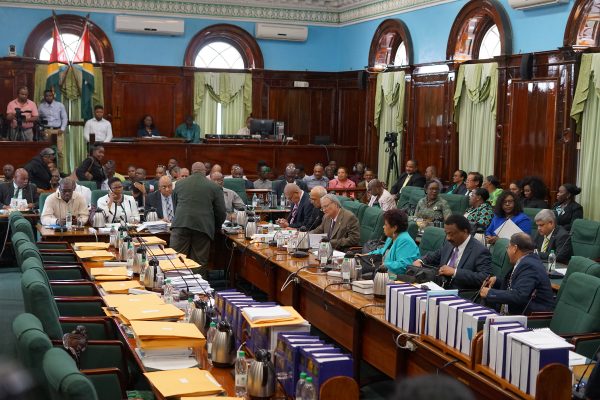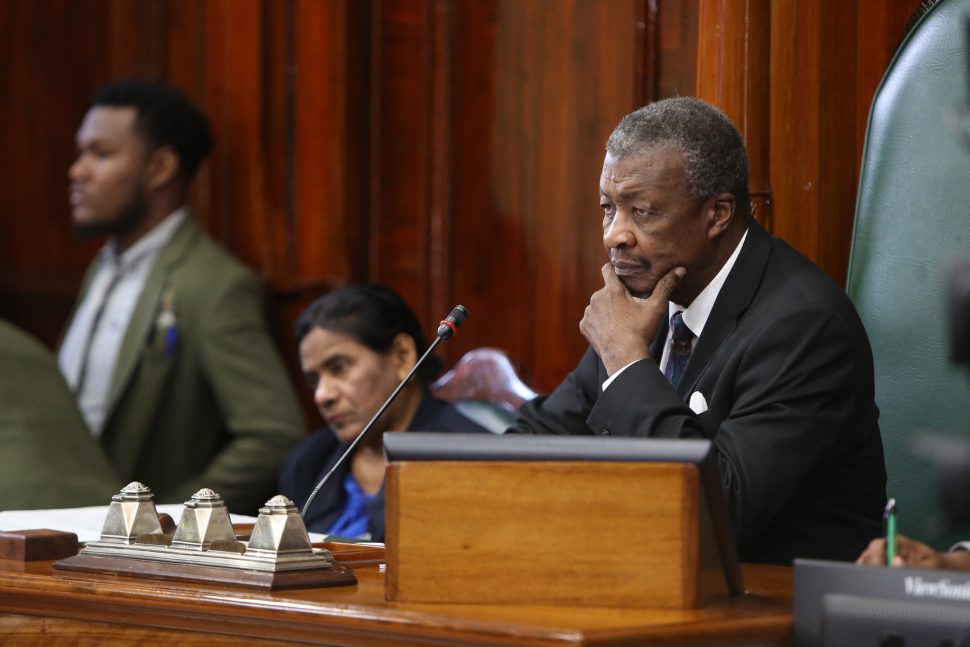-gov’t to take case to court
Speaker of the National Assembly, Dr. Barton Scotland yesterday refused to reverse his recognition of the December 21 no-confidence motion which triggered the fall of the government and said he had envisaged discussions between APNU+AFC and the opposition on “the most propitious manner in which effect can be given to the provisions of the Constitution”.
The provisions in question require the resignation of Cabinet inclusive of the President and the holding of general elections in 90 days.
Immediately after the Speaker’s ruling yesterday, Attorney General Basil Williams SC signalled government’s intention to approach the courts as early as today to challenge the validity of former MP Charrandas Persaud’s vote and to seek an order staying the holding of general elections within the legally stipulated 90 days.

Just before allowing the business of the National Assembly to go on in keeping with the Order Paper, Scotland pronounced on the consequences of the vote. While contending that he did have the authority to reverse the ruling, he expressed the view that it is a matter that should be dealt with by the courts.
“…the Speaker on this occasion and without more, declines the invitation to act in reversal. Full, final and complete settlement of these issues by a Court of competent jurisdiction will place beyond doubt any question which may exist and serve to give guidance to the Speaker and to the National Assembly for the future,” he said in a statement which was read to the House.
As was expected, the Opposition PPP/C’s benches were empty yesterday.
Scotland after reminding the House about the events which led him to rule that the motion which was brought by the PPP/C was carried, said that the provisions of the Constitution envisage discussions between the Government and the Opposition to find the most propitious manner in which effect can be given to the provisions of the Constitution. He cited Article 106(7) which speaks to the holding of elections after the passage of a no confidence vote.
Noting that he had hoped to speak to the members about the discussion between the two sides, Scotland reminded that following his ruling the leaders of both sides of the House spoke of respect for one another and of the opportunity which the result of the vote offers both sides.
Since December 21, the government has made no attempt to engage the PPP/C on the consequences of the vote, preferring instead to challenge its legitimacy. Opposition Leader Bharrat Jagdeo had requested a meeting with President David Granger on this matter. A meeting is scheduled for January 9th – 18 days following the passage of the motion and expected resignation of cabinet.
Scotland informed that during the last week, he had received from diverse sources, information, both solicited and unsolicited, supported by Case law and Practice emanating from other jurisdictions which has raised doubts as to whether the No-confidence Motion was carried, and properly so, by the margin of the vote.
According to Scotland the information which he had received raises two issues. The first of these issues included a claim supported by several cases that the requirement for the successful passing of a No-confidence Motion is a majority of the elected members of the National Assembly.
That majority, it is contended, was to be formed by a mathematical half of the elected membership of the National Assembly which is 65 plus the vote of one other member, he said adding that such a formula would require a majority of 34 votes instead of 33 by which the No-confidence motion was declared carried.
He went on to state that in furthering this argument it was contended that Article 168 of the Constitution which provides that “…all questions proposed for decision in the National Assembly shall be determined by a majority of the votes of the members present and voting” is different from and does not include provisions relevant to a No-confidence motion since that is separately provided for in Article 106(6) of the Constitution.
The second issue and one of equal importance for the National Assembly and its procedures, he said is Persaud’s conduct.
Persaud who has since been ejected from the Alliance for Change, a main party in the coalition government ,defected and voted `yes’ to the motion. As such Scotland ruled it was carried 33 votes to 32.
Scotland told the House yesterday that it is being contended that Persaud was not a qualified elected member of the National Assembly and so is not entitled to vote, in that he is a citizen of a foreign country and has taken active steps to so exercise that status. It is further contended that he being an elected member of the National Assembly through a list could not abandon that list and support another and still retain the status of an elected member, he said before adding that these matters require urgent attention since the motion was passed by a vote of 33 to 32 and the now former member of Parliament took part in the vote for the majority.
According to Scotland, that certain and finite answers to these questions are necessary, goes without saying and it should be a concern of all members that such answers are obtained.
Authority
Scotland stated that he is empowered with the authority to reverse the ruling on the motion. This has been disputed by others.
“It is perhaps useful Honourable Members to let you know that the authority with which the Speaker is clothed enables him to revisit any Ruling which he has rendered and if in doing so he forms the opinion that the Ruling should not stand, he may reverse his Ruling. The only limitation on the action of the Speaker in this regard is the requirement that the Speaker must at all times act in full obedience to the Constitution which is the Supreme Law of Guyana. It is the Constitutionality of action which must at all times guide and direct the Speaker,” he said.
The Speaker added that his “very wide” authority to reverse his ruling is not however one which he “holds himself able to exercise without strong and compelling grounds, simply choosing one position in place of an earlier one.”
This statement would seem to suggest that he didn’t think the government had sufficient grounds and this may also be a hurdle in the courts.
Further, Scotland pointed out that it has been his preference and practice to endeavour to find resolution of any issue which may affect the procedures and practice of Parliament without third party intervention. “I must tell you Honourable Members that the issues which we now face cause us to look outside of Parliament to find answers,” he stressed.
As Scotland spoke a smiling Williams could be seen nodding his head in agreement. The other government MPs did not react as he did but rather sat listening attentively.
Scotland pointed out that the issues over which many have expressed concern require “final determination” which will place the interpretation and import of the particular provisions of the Constitution beyond doubt.
All the way
Williams later expressed satisfaction with the Speaker’s position and said that government is prepared to go all the way to the Caribbean Court of Justice (CCJ).
He explained that government’s case will be two-fold and will include a stay of execution to stop the holding of elections in 90 days as stated in the Constitution. “I don’t see how we could go to court and not preserve the status quo so we have to preserve the status quo until the court finishes with the matter,” he said.
According to Williams the first action which will deal with the disqualification of Persaud from the voting process given his dual citizenship, will be filed by Senior Counsel Rex McKay sometime today. Stabroek News has since learnt that the documents have already been prepared and that they will be filed at the High Court first thing this morning.
He said that the other matter will deal with the majority argument.
The Attorney General could not predict the duration of time that the matter would be engaging the attention of the various courts but stressed that government has a good case. “…Rest assured, it’s just like the two terms case. Why fuss?” he stressed before adding that there is enough time for the case to be determined by the various courts.
Williams stressed on the need for political cooperation and said that it was always a concept he supported. Asked about the ingredients that are needed to cultivate an environment for this to take place, Williams said that he did not want to preempt anything. “The president is meeting with the Leader of the Opposition so I don’t wish to say anything about that,” while adding that the meeting is set to take place soon.
Williams declined to comment on whether the two could agree to call off the court action. He reiterated that he did not wish to preempt anything and maintained this position when pressed further.
On whether it would have been wiser to await the outcome of the meeting before heading to court, he responded “why would we wait? How do you know how it (the meeting) will eventuate? You don’t know how it will eventuate so. We have a good position you know that the vote was not correct, you know one person was disqualified from the vote so let’s go ahead.”
Asked to comment on the Speaker’s statement, Williams said “I think it was pretty good. I thought he felt that rather than a decision made in the Parliament you might as well go to the right forum and settle the issue. He approved of the issues. He thought that the issues were good issues…substantive issues that should be resolved by the court and we don’t have a problem with that.”






